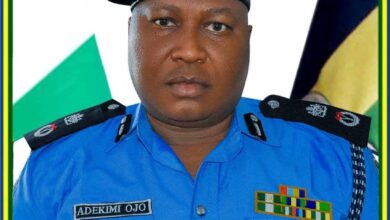Kogi West Senatorial: Adeyemi remains my political wife – Dino

Candidate of the Peoples Democratic Party (PDP), Dino Melaye and his
All Progressives Congress counterpart, Smart Adeyemi have launched
into a war of words after the Kogi West senatorial election rerun.
Adeyemi defeated Melaye on Saturday after a court-ordered rerun,
unseating Melaye who had previously been declared winner in the
general election.
Melaye, via his twitter handle, remarked: “The reaction of men and
women of goodwill all over Nigeria especially the wonderful people of
Kogi West who truly voted for me is a testimony that God is with me
and with us all. I won the election and Adeyemi remain my political
wife,” he said.
Adeyemi, while speaking with newsmen however, described Melaye as his
“political houseboy”.
“When a servant steals the garment of his master, the garment will be
too big for the servant… the joy of having his master’s garment will
cause the servant to misbehave to people he ordinarily could have
respected. The over-sized garment made Melaye to misbehave while in
the senate,” he said.
Speaking further, the two-time Senator apologised on behalf of the
people of his constituency to all those Melaye had offended “through
his unguided utterances and actions” and said the trait was “alien to
the culture and tradition of his people.”
He specifically begged President Muhammad Buhari, the APC national
Chairman, Adams Oshiomole, the APC leader, Ahmed Tinubu, the Governor
of the state, Yahaya Bello and a host of others that Melaye had at one
time or the other had altercation with to forgive the defeated
senator.
Adeyemi pledged “to represent the people with dignity and decorum” at
the Red Chamber, and also promise to do more for the people of his
constituency in his third term at the Senate.
He thanked the electorate, the APC, traditional rulers, Governor Bello
and all those who contributed to his success at the poll and stressed
he would not disappoint them.
Meanwhile, Melaye also claimed he has survived five assassination attempts.
“I want to specially thank God almighty that he preserved my life
after five attempted assassination, combined forces of security
agencies, INEC, federal, state and LG powers,” he said.
“I was fought on land, in the air and spiritually. It was not about
election but my life. God I thank you. The forces against me are not
beyond God. People should not worry about me, I am fine and will
always be. I just thank God that the plan to kill me did not succeed.
A living Dog is better than a dead Lion. I thank God for life. My name
is Daniel I cannot fall or fail.”
Melaye, who was of the APC in 2015, had defeated Adeyemi, then of the PDP.
Both men swapped parties in 2019, with Adeyemi losing but getting the
result annulled by the tribunal which ordered a rerun.
The rerun was conducted on November 16 but declared inconclusive and
INEC conducted a supplementary election.
Adeyemi got 88,373 votes to defeat Melaye who polled 62,133.
Melaye, however, has vowed to contest Adeyemi’s victory at the tribunal.
“I will challenge the temporal and evaporative victory of Adeyemi at
the Tribunal. Victory attained by violence and fraud is tantamount to
defeat, for it is momentary. It is not about Dino Melaye, it is about
Nigeria and our electoral system. I stay the course. Not over yet,” he
tweeted.





